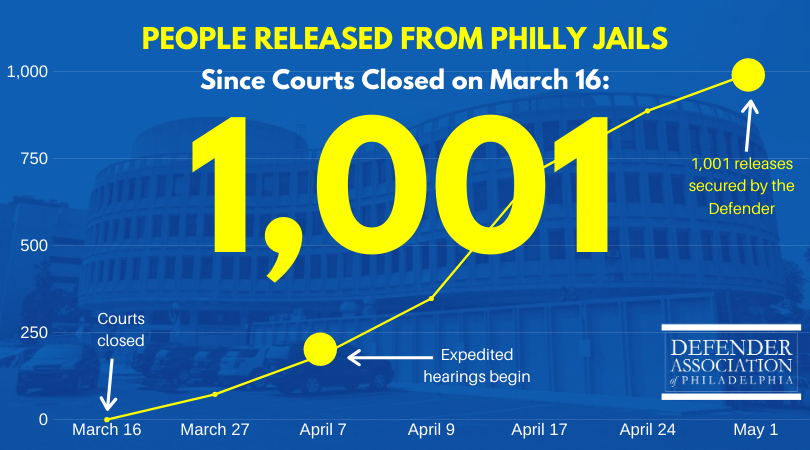Defender representation has secured the release of over 1,000 people since the courts closed on March 16.
Less than 1% of people released have been re-arrested since expedited hearings began on April 7.
Support from community organizations has been critical to public safety.
“The coronavirus is a particularly pernicious threat in our jails, so it’s critical that we do all we can to safely release as many people as possible,” said Chief Defender Keir Bradford-Grey, “Right now, public defenders are playing a huge role in reducing the prison population.”
On March 20, the Defender was directed by the FJD that all emergency requests for bail reductions, detainer lifts, and early parole must be filed as written petitions with the court. Since then, the Defender has filed over 1,000 written petitions and argued more than 3,200 motions in hearings on behalf of people held in custody in our city’s jails.
The Defender’s work to get early releases for incarcerated people not only enhances public health by slowing the spread of COVID-19 but has so far refuted any notion that releasing these individuals is a threat to public safety. Only seven out of 966 people released–less than one percent–have been re-arrested since emergency expedited hearings began on April 7. Bradford-Grey attributes this low recidivism rate to the Defender’s community-centered approach to public defense.
“The community groups in our Pre-Entry Coalition have really stepped up and provided critical services to our pretrial population,” she said, “At a time where so many city services have been limited or shutdown due to the pandemic, the support they’ve provided to our clients has been a major contributor to public safety.”
The next step for the Defender is to build on the early success, which will require a shift in focus from broad categories for early release to hearings for more complex cases.
“Eighty percent of the people sitting in jail right now are presumed innocent– it’s our responsibility to make sure that no one is denied their right to a fair trial,” said Bradford-Grey, “Moving forward, releasing more people will require us to work closely with the courts, the District Attorney’s Office and the prisons on creative ways to ensure that everyone gets their day in court.”
# # #
[/vc_column_text][/vc_column][/vc_row]
